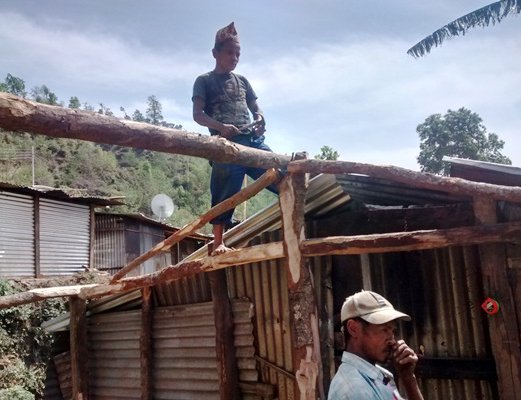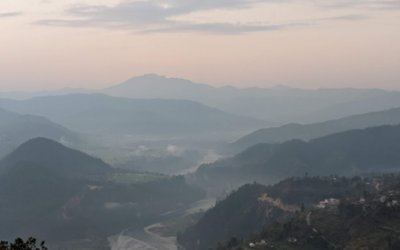
When he heard the news from Radio that a 7.5 Richter scale earthquake hit Afganistan-Pakistan border, Krishna Pradhan, a resident of Chautara, whose house was damaged by the Gorkha earthquake, remembered the shock he had felt in his own experiences in April.
Living in a temporary shelter near his house, waiting for the government help, Shrestha recalled the horror, pain and government apathy the quake victims, including himself, faced. “It is very difficult to live in the shelter. I pray nobody should live in such a difficulty. Except a few INGOs and NGOs, no one came to help us, let alone taking our care. Everybody seems to have forgotten us,” said Shrestha.
Shrestha is not alone in feeling forlorn. Many victims of the last earthquake in the district headquarter Chautara have similar woes to share. Although Nepal’s Constituent Assembly has passed the new constitution, the elections of the new prime minister, president and vice president, and so on, engaged the leaders so much that they had little time to bother about all this. “I have been visiting the local banks for the last many months in vain. As I don’t have enough money, I don’t know what to do next.”
Banshlal Ghimire, 60, is worried, too. “Given the present scenario, I don’t think my house will be ready for the deepening winter. I have to live with this temporary shelter for the coming years,” said Ghimire. “I don’t know where our government leaders, who promised us relief after the quake and warmer future are.”
The government response to earthquake victim remains poor. The last government failed to replace the National Reconstruction Authority Ordinance, which resulted in the failure to give shape to the body. The present government is yet to appoint the finance minister and member of National Planning Commission even a month after the promulgation of the constitution.
The NRA has remained in limbo after the government legislation that originally created it lapsed almost two months ago - a replacement bill to renew its legal mandate has yet to be passed by Parliament.
“What I can say now is that the situation of earthquake victims is pathetic. Post Disaster National Assessment has clearly shown the loss and damage in the country. There is the need to constitute the National Reconstruction Authority to accelerate the task,” said Professor Dr. Govinda Raj Pokharel, former vice chairman of National Planning Commission and former chief executive of the short lived National Reconstruction Authority. “We have started certain works, the time is running out.”
Now, Nepal’s readiness for disaster has come into question again.
Shrestha and Ghimire from Chautara, which has relatively easy access to roads, are among thousands elsewhere facing similar difficulties. Even the people living in Sankhapur area, close to Kathmnadu, have similar stories to tell.
An estimated 850,000 homes were destroyed or badly damaged in the 7.6 magnitude earthquake six months ago and subsequent aftershocks. Tens of thousands of people are still living in basic shelters built from bamboo and corrugated metal, which are not fit for freezing winter conditions. It is estimated that at least 81,000 households are in need of durable shelters and additional support to cope with the cold.
All the earthquake victims are living in pain and anguish arising out of the government’s apathy to their plight. The situation is getting worse from bad as the supply of essential goods has been hampered with the scarcity of petroleum products. For the last two months, the Madheshi agitation and undeclared blockade by India have sharply reduced the supply of food products and other essential goods.
Lying in active seismic zone, Nepal may have to see another major earthquake any time soon. As the threat is looming, Nepal needs to carry out post disaster work effectively and immediately and be prepared for another rude jolt.
Based on available data, seismologists across the world have been expecting a great earthquake for over 500 years now along the 400km fault-line under the Himalayas, but are uncertain. That will affect large parts of western Nepal.
April's double earthquakes in Nepal of 7.8 magnitude on the Richter scale was two points away from being a "great" earthquake. Several studies found that it only released some built-up strain in the plates.
A Race Against Time
At a time when Nepal’s internal institutions are busy holding elections for constitutional positions, Nepal’s development partners, International and National Agencies are expressing their concern over the situation and the delay in the response.
Although Nepal has made several efforts, shelter and food remain the top priorities as winter approaches. With the Government of Nepal, humanitarian partners provided emergency shelter to over 700,000 families, but the effect of the coming harsh cold weather is a concern with many people still without permanent and durable housing.
“While much has been achieved, the humanitarian community remains committed to meet the remaining needs,” said Jamie McGoldrick, Humanitarian Coordinator in Nepal. “With the winter on the way, we must ensure adequate shelter and food security, particularly for more than 80,000 families.”
Over the last six months, Nepal’s major development partners DFID, USAID and humanitarian agencies including UN agencies like UNICEF, WFP, FAO and other INGOs provided food to over 1.4 million people, established temporary classrooms for 300,000 children and supported health authorities to restore all damaged health facilities by June.
“When faced with tough challenges like the monsoon season, landslides and difficult terrain, we are proud how we have been able to support the Government and people of Nepal and respond to the challenges overall,” McGoldrick said. “But present conditions are a concern.”
Since the end of September, fuel short supply has impeded progress. The Humanitarian Country Team is urging a quick resolution to the fuel shortage so that winter goods can be quickly delivered to vulnerable households. This massive logistical undertaking can be achieved, McGoldrick says, but the lack of fuel is significantly affecting distribution of goods. There is a brief window of fair weather in which humanitarian actors can respond before the snow.
With the humanitarian needs of earthquake-affected communities largely met, the Humanitarian Country Team is working very closely with the Government and other partners to ensure a smooth transition to recovery and reconstruction.
“The Humanitarian Country Team is looking forward to the establishment of the National Reconstruction Authority,” said McGoldrick. “Once it becomes operational, we anticipate that we will start to see the rapid expansion of reconstruction across the earthquake-affected areas.”
Along with UN agencies, over 100 INGOs like OXFAM are also concerned about the situation. “Relief for the 8 million people affected by the huge Nepal earthquake six months ago is still being disrupted by delays in reinstating the government’s National Reconstruction Agency,” says Oxfam.
Protests at the border with India have held up fuel deliveries for more than months, causing shortages that are preventing Oxfam and other aid agencies from reaching an estimated 81,000 families who need durable shelter and relief items such as blankets before sub-zero temperatures set in.
"The Nepal government must put recovery efforts back on track by immediately passing the bill that will reinstate the NRA. It must also urgently resolve the ongoing fuel crisis before it is too late for us to deliver winter supplies to affected communities,” said John Augsburger, Oxfam Humanitarian Program Director in Nepal.
“The fuel crisis is narrowing the window we have to reach communities before the cold winter sets in. Temperatures frequently drop below zero in mountainous Nepal and this is going to take its toll on earthquake survivors - particularly the elderly, pregnant women and children.”
“Oxfam has been able to reach more than 445,000 people in seven of the worst-hit districts. Oxfam is providing blankets, mattresses, and warm clothing to help with the cold, as well as shelter kits, clean water, toilets, hygiene equipment and rice seeds.”
Jagannath Kurmi, Chairman of the National Network of Community based Disaster Management Committees (NCDMC), said: “It is still unclear what the government’s support for reconstruction will look like. The reconstruction work has been very sluggish. People somehow survived the monsoon but they will soon be facing the challenge of the winter, if they are not provided with adequate support. The winterization kits should be provided immediately.
"In the absence of clear designs and guidelines, those able to rebuild their houses have not yet started rebuilding. The government must push forward with the reconstruction work. The government should also make it possible for the poor and the earthquake-affected to get support.”
The Government of Nepal should urgently reinstate the National Reconstruction Authority to get earthquake recovery and reconstruction efforts back on track, said Oxfam in a paper titled ‘Rebuilding a More Resilient Nepal” launched lately.
It has also urged the government to provide additional support to households that will remain in temporary housing over the winter, communicate earthquake-resistant designs so households can build back safer, ensure principles of equality and inclusivity, community-led reconstruction and transparency and accountability at the heart of reconstruction plans, integrate food security and livelihoods recovery with reconstruction plans and ensure meaningful participation of women and men from excluded groups in relevant decision-making structures and processes.
“The post earthquake reconstruction plan should uphold the principles of equality and inclusion, and ensure special provisions for single women, senior citizens, people with physical disabilities, orphans, and people from marginalized communities,” Dhital added, “Further delays in finalizing and implementing reconstruction plans mean people are unprepared for winter.”
Consequences
Since the coalition partners are yet to complete the expansion of the cabinet and dispute with Madhesh based parties is yet to come, it is unlikely to see any acceleration of post disaster efforts. If the situation continues to prevail, there will be devastating consequences in the region.
Reporting from Chautara

Keshab Poudel
Poudel is the editor of New Spotlight Magazine.
- IWMI: SoLAR Global Science-Policy Forum Conference
- Apr 25, 2024
- CLA: Samriddhi For Skill Development
- Apr 23, 2024
- ECONOMY: Growth At 3.3
- Apr 16, 2024
- DPM’s SHRESTHA’S CHINA VISIT High Profile, Low Key
- Apr 14, 2024
- Maha Kumbha In Barahkshetra: A Sacred Festival In Sacred Koshi (Kaushiki) River
- Apr 09, 2024
















